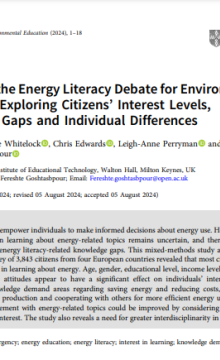
Energising the Energy Literacy Debate for Environmental Education
Abstract
Energy literacy can empower individuals to make informed decisions about energy use. However, the level of public interest in learning about energy-related topics remains uncertain, and there is a dearth of research exploring energy literacy-related knowledge gaps. This mixed-methods study aimed to address those issues. A survey of 3,843 citizens from four European countries revealed that most citizens have only a moderate interest in learning about energy. Age, gender, educational level, income level, living situation and environmental attitudes appear to have a significant effect on individuals’ interests. The study identified key knowledge demand areas regarding saving energy and reducing costs, becoming self-sufficient in energy production and cooperating with others for more efficient energy use. The findings indicate that engagement with energy-related topics could be improved by considering affective factors such as individual interest. The study also reveals a need for greater interdisciplinarity in energy research.
Irina Rets, Denise Whitelock, Chris Edwards, Leigh-Anne Perryman, Fereshte Goshtasbpour
Introduction
Climate change is “the defining crisis of our time” (The UN Refugee Agency, 2020) and is progressing more quickly than feared. Yet, as a society, we seem unable to respond to the climate crisis. Some experts diagnose this as our collective failure to learn: failure to learn to live with planetary limits.
Evidence suggests that individuals who are more aware of their daily choices, such as energy-related decisions, can better manage their energy consumption, thereby contributing to climate change mitigation (e.g. Cordero et al., Reference Cordero, Centeno and Todd2020). However, a number of studies report overall low energy literacy levels among people.

The study makes practical recommendations for a more effective climate awareness provision and calls for a more interdisciplinary approach to energy literacy research. We argue that such an approach can lead to the development of a more comprehensive energy literacy framework. This study contributes to energy literacy research by exploring a novel area: interest in learning about energy-related topics. Understanding this interest is crucial, and in the long term, this can play a pivotal role in addressing the climate emergency.